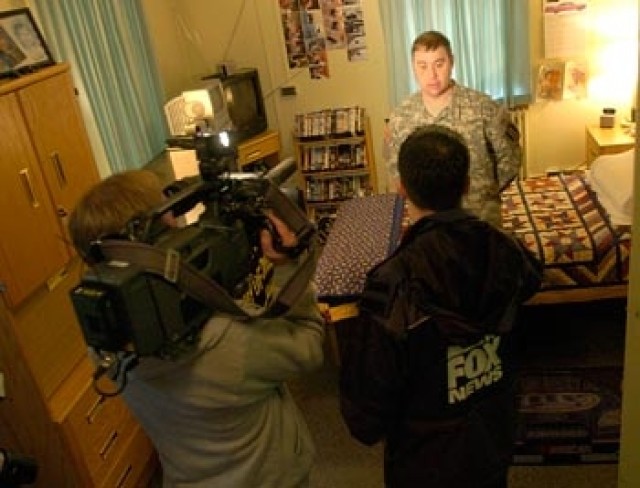Medical center gives media tour after allegations.
Quality care for Soldiers is Team Lewis' most important task, and one that is not taken lightly.
That was the message expressed to members of the local and nat-ional media who attended a press conference at Madigan Army Medical Center and toured the MAMC medical hold and medical holdover barracks March 7.
Team Lewis officials invited press in response to allegations made by Operation Homefront, an advocacy group for military members and their families, that Fort Lewis Soldiers were being housed in unsafe barracks. The group also claimed that Soldiers did not have adequate access to medical care case managers.
Operation Homefront volunteers told the press that some Fort Lewis Soldiers were being housed in barracks where lead and asbestos were present.
The allegations seemed to be leveled at the Madigan medical hold barracks, but Garrison Commander Col. Cynthia Murphy called the building "perfectly safe" since all asbestos and lead-based paint in the building was sealed and encapsulated to ensure the safety of the Soldiers staying in the barracks.
Asbestos becomes a health concern when it is fryable, or easily pulverized, then inhaled, according to Greg Opheim, Western Regional Medical Center industrial hygienist.
Opheim acknowledges that there is asbestos and lead-based paint in the building, as these were common construction materials when the barracks were built in 1944. "But (the barracks) were never in a condition that caused any hazard," he explained.
"It breaks my heart," Murphy said of the allegations that Soldiers were possibly at risk of lead and asbestos poisoning. "I would never put Soldiers at risk like that."
The nine remaining Soldiers living in the Madigan medical hold barracks were moved to another building last Friday and Monday.
The medical hold barracks, the building at which the allegations seem to have been leveled, began renovation Thursday. The extensive overhaul, a project that has been planned for about three years, includes replacing carpet, removing asbestos and lead-based paint, replacing radiators with new fin tube radiators, all new fixtures in lavatories and remodeling one suite of rooms and all common areas to meet guidelines set forth in the Americans with Disabilities Act. The project is estimated to take 260 days to complete, at which time the building will again be the barracks for MAMC medical hold.
The Soldiers in the medical hold over unit, supervised by the 654th Area Support Group, are housed in modular barracks about 18 months old, said 1st Sgt. Margarita Brunke. There are 170 medical holdover Soldiers. Nine of those live in hotels, 48 live in the barracks and the rest are housed on post or live in the local area. There is room in the modular barracks for 110 Soldiers.
Operation Homefront also told the press that caseworkers at Madigan have been laid off, leaving many Soldiers without access to the help they needed.
Brig. General Sheila Baxter, commanding general of MAMC, refuted this claim at the press conference, stating that Madigan had never laid off case managers. Since the beginning of the war, Madigan has increased the number of case managers from two to 18. At one time, there were two Department of Defense case workers, part of the Defense Department's Army Wounded Warrior program, who had office space in Madigan. Those two case workers, who are no longer working at MAMC, were never Madigan employees, said Pam Birgenheier, deputy director of Health Outcomes for MAMC.
The 18 case managers who work in the Health Outcomes department of MAMC are registered nurses employed by Madigan to coordinate medical care for ill and wounded Soldiers, Birgenheier explained. The Defense Department case workers were social workers who coordinated federal and civilian resources for Soldiers and family members.
Deputy Commanding General and Chief of Staff for I Corps and Fort Lewis Brig. Gen. William Troy acknowledged that while Madigan may not meet every, single expectation of every, single Soldier, he is absoultely certain that Madigan is doing a "very, very good job" in the vast majority of cases.
"Soldiers are the heart of our army," Troy said. "We feel we have a solemn obligation to provide them with the best possible care we can." Madigan provides quality health care for every Soldier, Baxter added. "That health care would never be compromised," she said.
The allegations made by Operation Homefront came shortly after the discovery of inadequate living conditions at Walter Reed Army Medical Center, which lead to congressional hearings on the quality of care and housing Soldiers are receiving at the Washington, D.C., hospital.
Best ways to address concerns
Aca,!Ac Soldiers can address any issues concerning medical care through their case managers.
Aca,!Ac Any concerns beyond medical care should be addressed to a Soldier's chain of command.
Aca,!Ac There are monthly town hall meetings, held the first Thursday of each month, in which medical holdover Soldiers can voice concerns, frustrations and complaints, and also learn about different agencies that come to speak, in an open-door forum.


Social Sharing